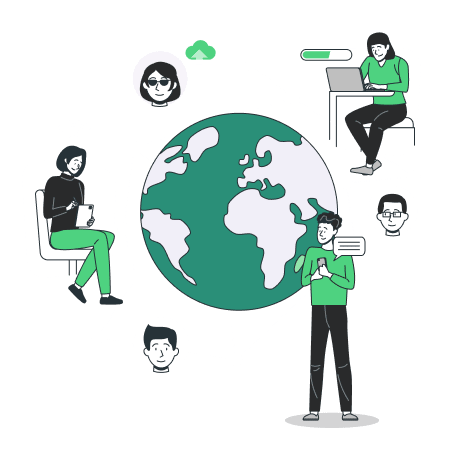AI-Driven Mentorship & Retention: A Strategic Advantage for Global Teams
In 2025, employee retention has become one of the toughest challenges for startups and SMBs. With high churn rates and rising demand for personalized learning, leaders need scalable ways to engage and retain top talent. The solution is already here: AI-powered mentorship and development frameworks.
Short Answer:
AI-driven mentorship helps companies retain talent longer, accelerate promotions, and reduce hiring costs—a game-changer for startups running distributed or India-based GCC teams.
Why AI-Powered Mentorship Matters Now
Several forces have converged to make mentorship, powered by AI, a strategic advantage:
- Retention Gains – Sun Microsystems saw 72% retention among mentees vs. 49% for non-mentees. T-Mobile reported a 78% retention rate with mentoring—nearly double compared to those without.
- Cost Savings – Replacing an employee can cost 0.5–4x their annual salary. In India’s GCCs, where early attrition can reach 30%, even extending tenure by 6 months saves millions.
- Career Acceleration – Mentees are 5× more likely to be promoted, fueling leadership pipelines.
- Engagement & Belonging – Especially in distributed teams, mentorship builds connection and loyalty, a crucial advantage for fast-growing India GCCs.
As India emerges as a top GCC destination for U.S. startups (see our breakdown in The Evolution of India’s GCC Ecosystem), building retention into the foundation of operations is non-negotiable.
Embedding AI into the Employee Lifecycle
1. Smarter Onboarding
AI chatbots and interactive workflows cut onboarding time significantly. A new engineer in Hyderabad or Chennai doesn’t need to wait for timezone-aligned responses—they can self-serve answers instantly, accelerating productivity.
2. Scalable, Inclusive Mentorship
AI tools match mentors and mentees by skills, goals, or working styles—democratizing access that would otherwise favor only senior employees or those in close proximity. This is especially powerful in distributed GCC models where cross-border collaboration is critical.
3. Embedded Learning & Upskilling
AI-curated content and role-based learning tracks ensure continuous growth. Developers, designers, and analysts all receive personalized nudges for certifications or skill upgrades. In India, 89% of Gen Z employees say they value growth opportunities over pay—AI makes this scalable.
4. Early Warning Signals via People Analytics
Attrition no longer needs to be a surprise. By analyzing engagement patterns, promotion cycles, or team sentiment, AI can flag at-risk employees early, giving managers time to act before resignations occur.
Fast-Tracking AI Literacy in Teams
Building AI literacy across the workforce is essential—not just for engineers. Everyone from HR to project leads must understand AI’s role in decision-making.
- Role-Based Upskilling – Technical teams dive deeper into automation, while business leads focus on governance and ethics.
- Microlearning – Instead of long sessions, startups are adopting bite-sized AI modules and Slack-based nudges.
- Visible Champions – Internal “AI advocates” showcase use cases, encouraging adoption.
- Ethics & Oversight – With global regulations tightening (see our analysis on GCC Compliance in 2025), transparent communication is vital to building trust.
Practical Steps Without a Full AI Overhaul
Startups don’t need to launch massive AI transformation programs. Instead, lean experiments can quickly deliver ROI:
- Launch an AI FAQ bot for employee queries
- Use mentorship platforms like Donut or Mentorloop for pilot programs
- Track promotion and engagement data in HR systems, then layer in AI analysis
- Embed AI tools like GitHub Copilot into workflows
- Run fortnightly AI learning sessions for different roles
These steps create momentum while keeping costs lean—a model that works especially well in EOR-based teams where agility is key.
Conclusion
For startups and SMBs building cross-border teams, AI-driven mentorship is no longer optional—it’s the competitive edge in 2025. By embedding AI across onboarding, learning, mentoring, and engagement, companies can:
- Reduce early attrition
- Accelerate productivity and promotions
- Foster a continuous learning culture
- Build connected, high-performing global teams
At Ralent, we help U.S. startups launch and retain AI-first GCC teams in India. From onboarding design to AI-enabled learning and compliance, we embed mentorship into your operating model—ensuring your best hires stay longer, grow faster, and deliver more impact.
👉 Explore how Ralent’s GCC-as-a-Service can help you build smarter, more resilient global teams.
Additional questions
1. Why is AI-powered mentorship becoming a retention strategy for global teams?
Because AI can personalize development at scale—matching mentors, tracking learning outcomes, and predicting attrition risks. It transforms mentorship from a manual HR activity into a data-driven retention engine.
2. How does AI mentorship directly benefit India-based GCC teams?
It enables cross-border learning and leadership development within distributed setups. GCC employees get equitable access to mentors, growth paths, and performance insights regardless of location or time zone.
3. What are practical ways startups can embed AI into learning and engagement?
Start with small, scalable pilots—AI onboarding bots, skill-based mentor matching, and personalized learning nudges. These build adoption and measurable impact without heavy infrastructure costs.
4. How does AI help detect and prevent employee attrition before it happens?
AI models analyze engagement data, promotion cycles, and sentiment signals to flag early signs of disengagement—giving managers a window to intervene with personalized action plans.
5. Why is building AI literacy across roles critical to retention success?
When employees understand AI’s role in workflows, they adopt it more confidently. Upskilling non-technical teams on ethical AI use and automation readiness strengthens trust and collaboration.
6. What’s the long-term advantage of combining AI mentorship with GCC-based teams?
It creates future-ready organizations where learning, engagement, and performance are continuous—reducing churn, accelerating promotions, and making global teams more self-sustaining.
Further reading
Redesigning Talent for a New GCC Mandate: India + U.S. Perspective in 2025
Related Resources
SEZ Indian Evolution in 2025–26: Growth Catalyst for Global Investors
Building High-Trust US–India Teams: Lessons from the Ground
Schedule a personalized 1:1
